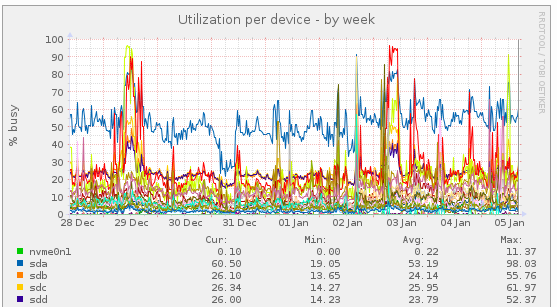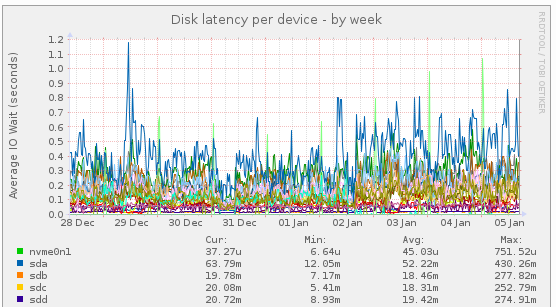
I have a RAID10 setup with 4x 2 TB WD Red disks in my server. Although the setup works fairly well and has enough throughput there is one strange issue with that setup: /dev/sda has more utilzation/load than the other 3 disks. See the blue line in the following graph which represents utilization by week for sda:

As you can see from the graphs and from the numbers below sda has a 2-3 times higher utilization than sdb, sdc or sdd, especially when looking at disk latency graph by Munin:

Although the graphs are a little confusing you can easily spot the big difference from the below values. And it’s not only Munin showing this strange behaviour of sda, but also atop:
Here you see that sda is 94% busy although the writes to the disks are a little bit lower than on the other disks. The screenshot of atop was before I moved MySQL/MariaDB to my NVMe disk 4 weeks ago. But you can also spot that sda is slowing down the RAID10.
So the big question is: why is utilization and latency of sda that high? it’s the same disk model as the other disks. All disks are connected to a Supermicro X9SRi-F mainboard. The first two SATA ports are 6 Gbit/s, the other 4 ports are 3 Gbit/s ports:
| sda | sdb | sdc | sdd |
|---|---|---|---|
| === START OF INFORMATION SECTION === Model Family: Western Digital Red Device Model: WDC WD20EFRX-68AX9N0 Serial Number: WD-WMC301414725 LU WWN Device Id: 5 0014ee 65887fe2c Firmware Version: 80.00A80 User Capacity: 2,000,398,934,016 bytes [2.00 TB] Sector Sizes: 512 bytes logical, 4096 bytes physical Device is: In smartctl database [for details use: -P show] ATA Version is: ACS-2 (minor revision not indicated) SATA Version is: SATA 3.0, 6.0 Gb/s (current: 6.0 Gb/s) Local Time is: Sat Jan 5 17:24:58 2019 CET SMART support is: Available – device has SMART capability. SMART support is: Enabled |
=== START OF INFORMATION SECTION === Model Family: Western Digital Red Device Model: WDC WD20EFRX-68AX9N0 Serial Number: WD-WMC301414372 LU WWN Device Id: 5 0014ee 65887f374 Firmware Version: 80.00A80 User Capacity: 2,000,398,934,016 bytes [2.00 TB] Sector Sizes: 512 bytes logical, 4096 bytes physical Device is: In smartctl database [for details use: -P show] ATA Version is: ACS-2 (minor revision not indicated) SATA Version is: SATA 3.0, 6.0 Gb/s (current: 6.0 Gb/s) Local Time is: Sat Jan 5 17:27:01 2019 CET SMART support is: Available – device has SMART capability. SMART support is: Enabled |
=== START OF INFORMATION SECTION === Model Family: Western Digital Red Device Model: WDC WD20EFRX-68AX9N0 Serial Number: WD-WMC301411045 LU WWN Device Id: 5 0014ee 603329112 Firmware Version: 80.00A80 User Capacity: 2,000,398,934,016 bytes [2.00 TB] Sector Sizes: 512 bytes logical, 4096 bytes physical Device is: In smartctl database [for details use: -P show] ATA Version is: ACS-2 (minor revision not indicated) SATA Version is: SATA 3.0, 6.0 Gb/s (current: 3.0 Gb/s) Local Time is: Sat Jan 5 17:30:15 2019 CET SMART support is: Available – device has SMART capability. SMART support is: Enabled |
=== START OF INFORMATION SECTION === Model Family: Western Digital Red Device Model: WDC WD20EFRX-68AX9N0 Serial Number: WD-WMC301391344 LU WWN Device Id: 5 0014ee 60332a8aa Firmware Version: 80.00A80 User Capacity: 2,000,398,934,016 bytes [2.00 TB] Sector Sizes: 512 bytes logical, 4096 bytes physical Device is: In smartctl database [for details use: -P show] ATA Version is: ACS-2 (minor revision not indicated) SATA Version is: SATA 3.0, 6.0 Gb/s (current: 3.0 Gb/s) Local Time is: Sat Jan 5 17:30:26 2019 CET SMART support is: Available – device has SMART capability. SMART support is: Enabled |
There is even the same firmware version of the disks. Usually I would have expected a slower disk IO from the 3 Gbit/s disks (sdc & sdd), but not from sda. All disks are configured in BIOS to use AHCI.
I cannot explain why sda has higher latency and more utilization than the other disks. Any ideas are welcome and appreciated. You can also reach me in the Fediverse (Friendica: https://nerdica.net/profile/ij & Mastodon: https://nerdculture.de/@ij) or via XMPP at ij@nerdica.net.
